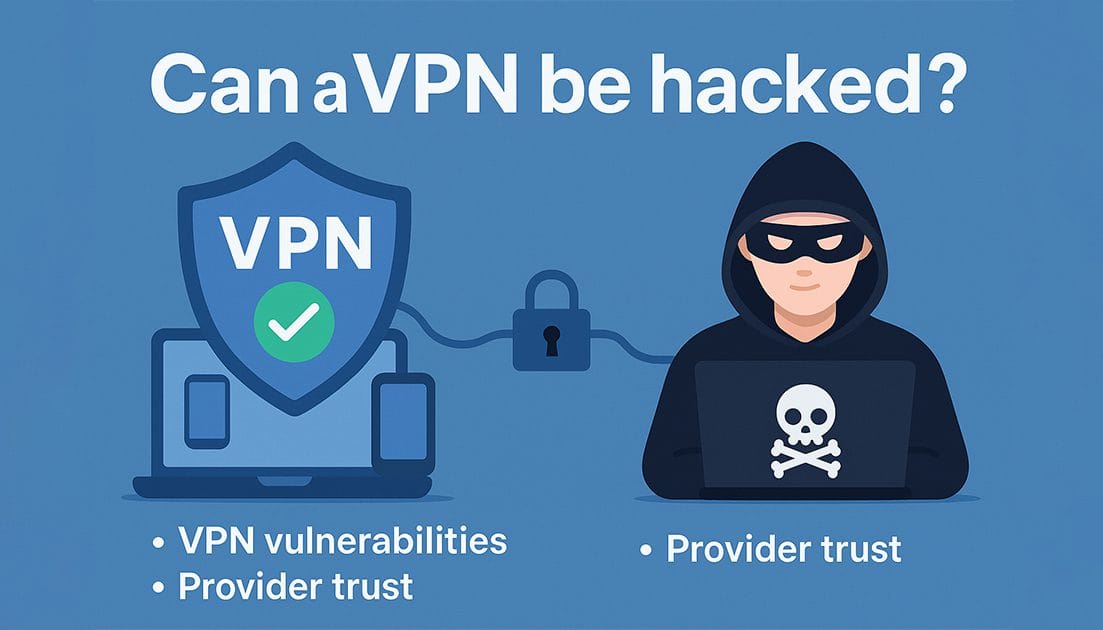VPNs are often marketed as tools for complete online privacy, but can a VPN actually be tracked? The answer isn’t as simple as yes or no.
A VPN hides your IP address and encrypts your traffic, making it much harder for websites, ISPs, or hackers to monitor your online activity. However, in certain situations, like using a weak provider or leaking DNS requests, your activity could still be exposed or partially traceable through advanced tracking techniques.
How a VPN Protects Your Data
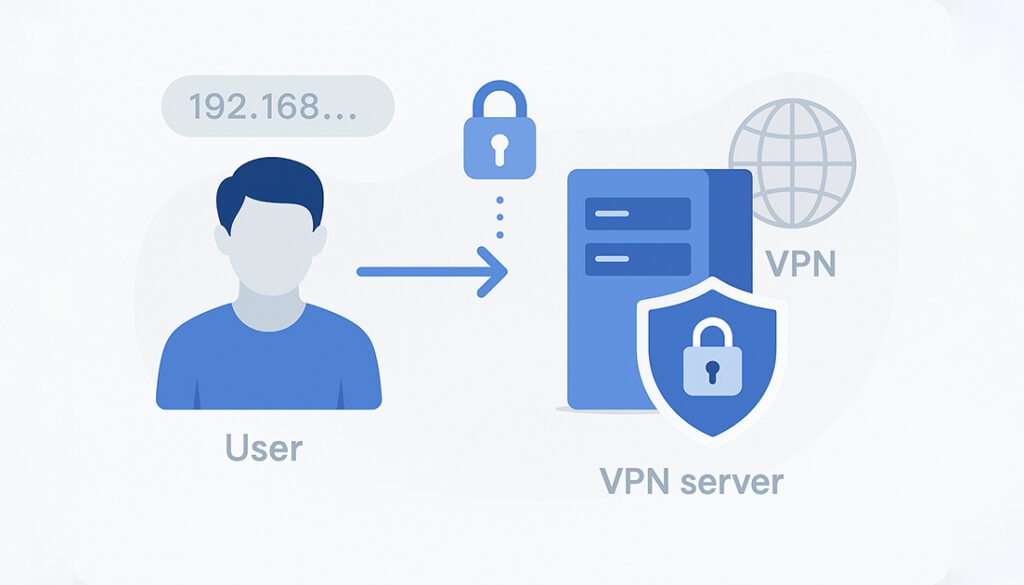
Before we dig deeper into how a VPN can be tracked, it’s important to understand how a VPN works in the first place. At its core, a VPN (Virtual Private Network) encrypts your internet traffic and routes it through a secure server, masking your real IP address and online activity from outsiders.
🔐 What a VPN Hides
- Your IP Address: Websites and apps see the IP of the VPN server, not your device.
- Your Location: You appear to be in the VPN server’s country, which helps bypass geo-restrictions.
- Your Activity from ISPs: Your internet provider sees encrypted traffic, but not the websites you’re visiting.
- Public Wi-Fi Risk: VPNs shield your data from snoopers on unsecured networks.
📊 Can VPNs Be Tracked Through Normal Internet Channels?
In most cases, VPN traffic is fully encrypted and hidden from ISPs, governments, and hackers. They can’t view your activity, but they might detect VPN usage by analyzing traffic patterns, port numbers, or connections to IP addresses owned by known VPN providers.
This doesn’t mean they can see what you’re doing, just that you’re doing it through a VPN.
Who Can Try to Track VPN Usage?

Now that you understand how a VPN protects your activity, let’s look at who might actually try to track your VPN usage and what their capabilities are. While a VPN encrypts your data and hides your IP, that doesn’t stop some entities from attempting to monitor your traffic indirectly.
🔍 Can ISPs Track VPNs?
Your internet provider can usually tell you’re using a VPN based on:
- Encrypted traffic patterns
- Constant connections to a specific IP
- Use of standard VPN ports (like OpenVPN or WireGuard)
But they can’t see the websites you visit or the data you send as long as your VPN is properly configured and not leaking DNS.
🌐 Can Governments Track VPN Users?
Yes, governments can detect VPN usage especially in countries with internet censorship. Some even block known VPN IPs or use DPI (Deep Packet Inspection) to spot encrypted VPN traffic. However:
- They typically can’t see your activity inside the VPN tunnel
- Obfuscated VPNs (Stealth/ShadowSocks) can bypass detection
Can a VPN be tracked by authorities? Only if:
- The VPN keeps logs
- You’re already under investigation and tied to specific server use
- You’re using a weak or free VPN with poor encryption
🧠 Can Websites Track VPN Users?
Yes, websites can often detect VPN IPs and block them. They may use:
- Known VPN IP databases
- Cookies and browser fingerprinting
- Behavior analytics (e.g. scraping patterns)
This is detection, not tracking your real identity, unless your VPN is leaking, or you log in to accounts while connected.
💼 Can Employers Track You Through a VPN?
If you’re using a personal VPN, your employer can usually see that you’re connected to encrypted traffic, but not what you’re doing. However, if you’re connected through a company VPN, the organization may monitor or log your activity within their network.
Can a VPN Be Tracked? – What’s Actually Possible
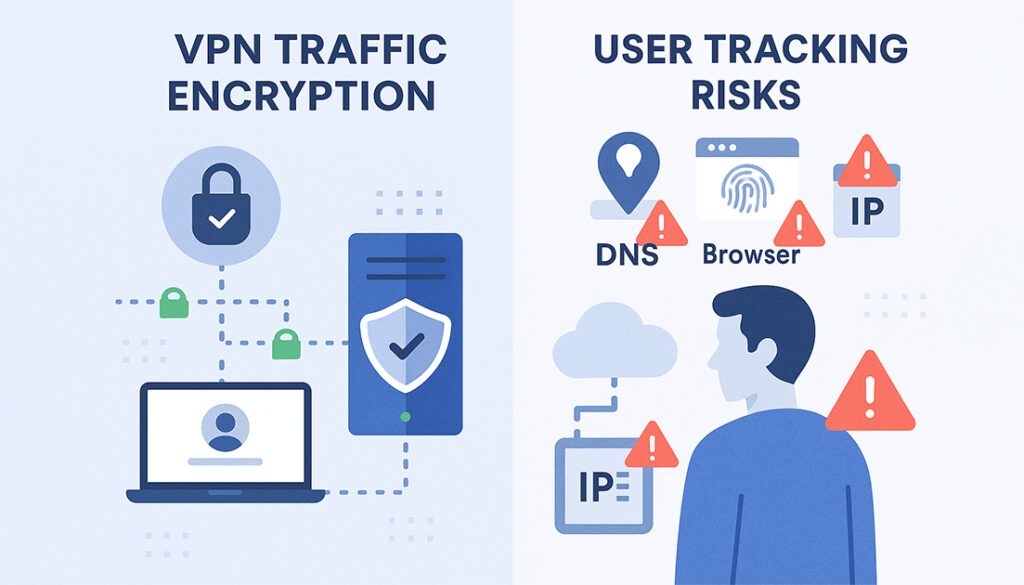
Let’s answer the main question in depth: Can a VPN be tracked? The truth is, while a VPN makes tracking extremely difficult, there are still ways your usage or activity could be detected under specific conditions, especially with weak VPN setups or user mistakes.
Here’s what tracking a VPN might look like:
🔁 Traffic Analysis & Metadata
While your data is encrypted, observers like ISPs or governments can still analyze when, where, and how much data you send. This is called traffic analysis. It doesn’t reveal what you’re doing, but in theory, it could correlate VPN usage patterns with online behavior.
🌍 VPN IP Recognition
Websites and platforms often block or flag known VPN IP addresses. They use databases to detect:
- Shared IPs from data centers
- Traffic from known VPN providers
- Repetitive login attempts or abnormal browsing behavior
This is detection, not personal tracking, unless you expose your identity in other ways (e.g., logging in to your real account while connected).
🧪 DNS and WebRTC Leaks
Some poorly configured VPNs leak DNS requests or WebRTC IPs, exposing your real location and identity. These are among the most common causes of partial VPN tracking.
You can check for these leaks at sites like:
🧱 Device Fingerprinting
Even behind a VPN, websites can identify you using browser fingerprinting. This includes:
- OS and browser version
- Screen resolution
- Installed fonts and plugins
This doesn’t reveal your IP, but it helps websites recognize your device over time.
🧾 VPN Logging Policies
If you’re using a VPN that keeps logs, authorities could request them under legal pressure. This is how law enforcement has occasionally tracked VPN users, not through the encryption itself, but through provider cooperation.
Bottom line? A good VPN will block nearly all tracking attempts, but no tool is 100% bulletproof, especially if you leak data, reuse identities, or choose the wrong provider.
VPN Weak Points You Should Know
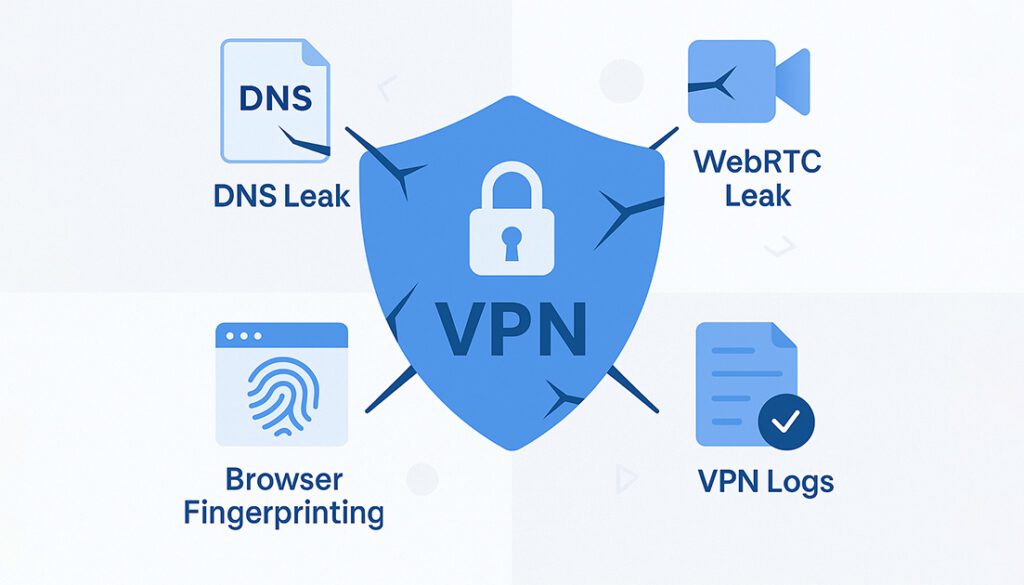
Even the most secure VPN can fall short if certain vulnerabilities aren’t addressed. If you’re wondering how a VPN can be tracked, these are the most common points of failure that expose users to detection or leaks:
🌐 DNS Leaks
A DNS leak happens when your computer sends website lookup requests outside the VPN tunnel, usually to your ISP’s servers. This exposes:
- The websites you visit
- Your real IP (in some cases)
- VPN usage patterns
✅ Use VPNs with built-in DNS leak protection, and test at dnsleaktest.com.
📽️ WebRTC Leaks
WebRTC is a browser feature used for real-time communication (like video calls), but it can reveal your real IP address, even when connected to a VPN.
✅ Disable WebRTC in browser settings or use privacy-focused browsers (like Brave or Firefox with WebRTC disabled).
🧠 Device & Browser Fingerprinting
Websites can collect tons of data about your system to create a unique fingerprint, allowing them to track you without your IP. Common fingerprint traits include:
- Fonts and screen resolution
- OS, browser version
- Installed extensions
✅ Use anti-fingerprinting tools (like uBlock Origin + Privacy Badger), or dedicated VPN browsers with built-in protections.
🗃️ VPN Logs & Jurisdiction
Some VPN providers log user activity, IP addresses, timestamps, or even websites visited. If these logs are stored in a country with strong surveillance laws, they can be subpoenaed.
✅ Always choose a no-logs VPN based in a privacy-friendly country.
🔌 Kill Switch Failures
If your VPN connection drops and your device continues to browse, you could leak your IP or activity without realizing it.
✅ Enable your VPN’s Kill Switch feature to block traffic if the VPN disconnects.
How to Maximize Privacy & Avoid VPN Tracking
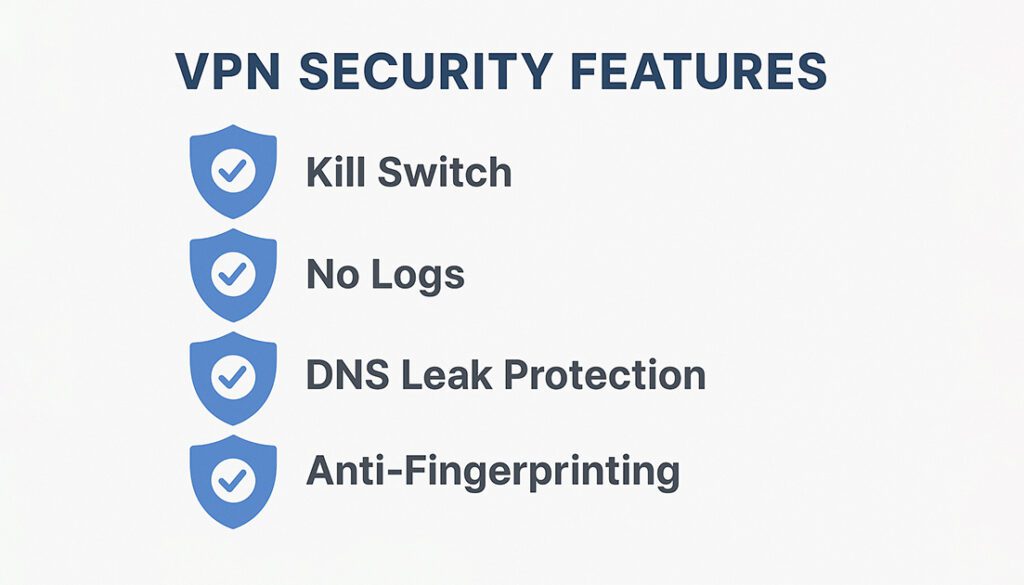
If you’re asking how to avoid being tracked while using a VPN, the key is combining strong tools with smart behavior. Here’s how to make your VPN as close to untraceable as possible:
🔒 Choose a True No-Logs VPN
Not all VPNs are private. Some log your IP, timestamps, or traffic metadata.
✅ Pick a provider with:
- A verified no-logs policy
- Independent security audits
- Jurisdiction outside 5/9/14 Eyes (e.g. Panama, British Virgin Islands)
Top examples: NordVPN, ExpressVPN, ProtonVPN, Surfshark
🧱 Enable the Kill Switch
This feature ensures no data leaks if your VPN disconnects suddenly.
✅ Always turn on the kill switch so your real IP isn’t exposed mid-session.
🌐 Block DNS & WebRTC Leaks
✅ Use a VPN with built-in DNS leak protection
✅ Disable WebRTC in browser settings or use browser extensions
🧠 Use Anti-Fingerprinting Tools
Even with a VPN, websites can recognize your device. Tools like:
- uBlock Origin (advanced mode)
- Privacy Badger
- Brave browser or Firefox with hardened settings
…help disguise your browser fingerprint.
🕵️ Use Obfuscated or Stealth VPN Modes
Some VPNs offer stealth/obfuscation features that hide the fact you’re using a VPN at all useful in restrictive countries or DPI-heavy networks.
✅ Look for features like Obfuscated Servers, Stealth Mode, or ShadowSocks.
🚫 Avoid Logins That Link to Your Identity
Your VPN can’t protect you if you log into personal accounts (e.g. Google, Facebook) while trying to stay anonymous.
✅ Use separate browser profiles or anonymous sessions for private activity.
Pros and Limitations of VPNs for Anonymity
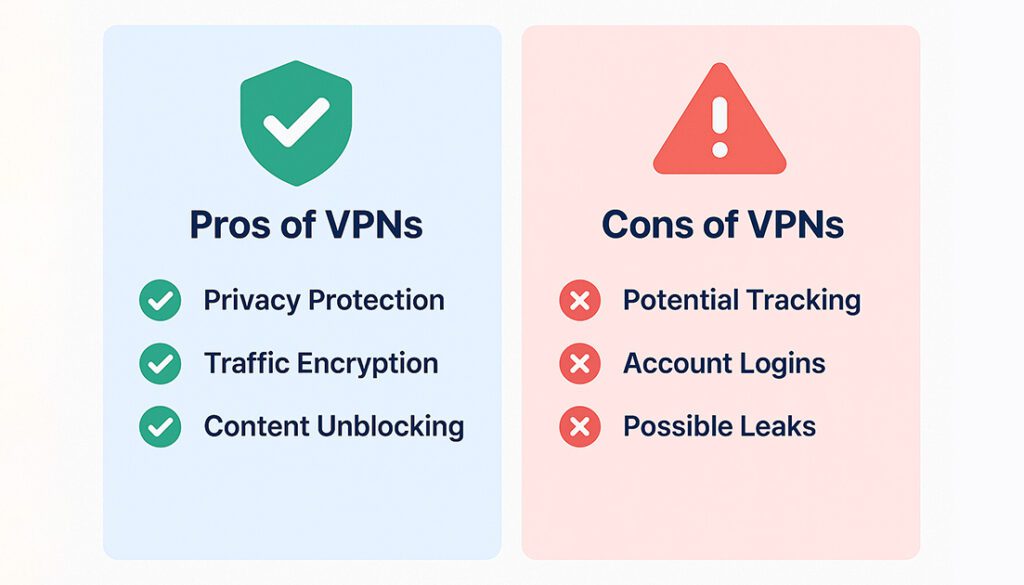
VPNs are essential tools for protecting your online identity, but can a VPN make you completely untraceable? Not quite.
They’re incredibly effective at hiding your IP address, encrypting your traffic, and giving you access to blocked content. But that doesn’t mean you’re invisible. VPNs don’t erase cookies, stop browser tracking, or prevent user error. Knowing what VPNs can and can’t do is the key to using them wisely.
Here’s a clear breakdown:
✅ What VPNs Do Well
- Hide your IP address with a VPN server’s IP
- Encrypt internet traffic so it can’t be read or intercepted
- Bypass geo-blocks and content restrictions
- Secure public Wi-Fi sessions from hackers
- Protect streaming or torrenting from ISP monitoring
❌ What VPNs Can’t Guarantee
- Complete anonymity if you log in to personal accounts
- Protection from browser tracking or fingerprinting
- Defense against phishing or malware threats
- Invisibility—VPN usage can still be detected
Frequently Asked Questions (FAQs)
1. Can a VPN be tracked by my ISP?
Your ISP can tell you’re using a VPN because the traffic is encrypted and goes to a known VPN server. However, they can’t see what websites you’re visiting or the content of your traffic.
2. Can a VPN be tracked by the government?
Yes and no. Governments can detect VPN use, especially with deep packet inspection. But if you’re using a no-logs VPN, they won’t be able to see your actual activity only that you’re using a VPN.
3. Can police track a VPN?
Only in rare cases. If a VPN logs your activity and law enforcement obtains those records (through court orders), it’s possible. This is why using a no-logs VPN is critical for privacy.
4. Can websites detect if I’m using a VPN?
Yes. Websites may detect VPN use through known IP addresses or browser behavior. They may block access or ask for verification, but they can’t see your real IP unless you’re leaking it.
5. Can you be tracked if your VPN disconnects?
Yes. If your VPN drops and there’s no kill switch enabled, your real IP could be exposed. Always use a kill switch feature to prevent leaks.
6. Can free VPNs be tracked more easily?
Often yes. Free VPNs may log user data, have weak encryption, or inject trackers themselves. They’re not recommended if your goal is real privacy.
7. Can VPNs prevent fingerprinting?
Not by themselves. VPNs mask IPs, but browser fingerprinting still works unless you take extra steps (like using anti-fingerprint extensions or browsers).
8. Can using a VPN make me 100% anonymous?
No. VPNs are powerful, but not foolproof. They don’t stop all forms of tracking, especially if you log into real accounts, reuse identities, or allow data leaks.
Final Thoughts: Can You Be Tracked with a VPN?
So, can a VPN be tracked? Technically, your traffic is encrypted and your real IP is hidden, making tracking extremely difficult. But detection is still possible, and under certain conditions, parts of your identity can leak if you’re not careful.
To stay safe:
- Use a reputable no-logs VPN
- Enable DNS and WebRTC leak protection
- Turn on your kill switch
- Avoid logging into personal accounts during sensitive activity
A VPN is a strong privacy tool, but it works best when paired with smart browsing habits.
Want Maximum Online Privacy?
Not all VPNs are created equal. Explore our expert-reviewed list of top VPNs to find the most secure and private options for anonymous browsing.
Top VPNs for 2025
